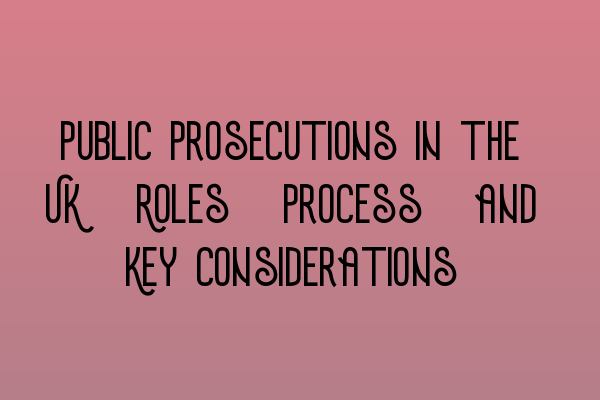Public Prosecutions in the UK: Roles, Process, and Key Considerations
Welcome to the SQE Criminal Law & Practice Law UK blog! Today, we will be delving into the fascinating world of public prosecutions in the UK. As a solicitor, it is crucial to have a comprehensive understanding of the roles, processes, and key considerations involved in public prosecutions. So, let’s dive right in!
The Role of the Public Prosecutor
The public prosecutor, also known as the Crown Prosecution Service (CPS) in England and Wales, plays a crucial role in the criminal justice system. Their primary responsibility is to represent the interests of the public by prosecuting cases against individuals accused of committing criminal offenses.
The CPS works in close collaboration with the police to review and evaluate the evidence gathered during an investigation. Their aim is to determine whether there is sufficient evidence to proceed with a prosecution and, if so, to bring the case before a court of law.
The prosecutor acts as the advocate for the state, presenting the evidence, examining witnesses, and making legal arguments to secure convictions. Their duty is to ensure that justice is served and that individuals who have committed criminal acts are held accountable for their actions.
The Process of a Public Prosecution
Now that we understand the role of the public prosecutor, let’s take a closer look at the process involved in a public prosecution case:
- Investigation: The police investigate a reported crime and gather evidence.
- Evaluation: The prosecutor reviews the evidence to determine whether there is a realistic prospect of conviction.
- Decision-making: Based on the evaluation, the prosecutor decides whether to proceed with the case and, if so, which charges to bring.
- Preparation: The prosecutor prepares the case for trial, which includes gathering additional evidence and witness statements.
- Trial: The case is presented before a court, where the prosecutor presents the evidence and arguments, and the defense has the opportunity to respond.
- Verdict: The judge or jury reaches a verdict based on the evidence presented.
- Sentencing: If the defendant is found guilty, the court determines an appropriate sentence.
Key Considerations in Public Prosecutions
When engaging in public prosecutions, there are several key considerations that solicitors must keep in mind:
- Evidence: Ensuring that there is sufficient and admissible evidence to support the charges.
- Legal Principles: Applying relevant legal principles, statutes, and case precedents to build a strong case.
- Procedural Compliance: Adhering to strict procedural guidelines to ensure a fair and just process for all parties involved.
- Public Interest: Assessing whether a prosecution is in the public interest, taking into account factors such as seriousness of the offense and impact on the community.
- Victim Support: Ensuring that the rights of victims are protected throughout the process and providing necessary support.
It is essential for solicitors practicing criminal law to stay updated with the latest developments and advancements in the field. To expand your expertise, we recommend attending our renowned workshops and seminars on criminal practice. These events provide invaluable insights and networking opportunities for legal professionals. For more information, check out our article on Workshops and Seminars on Criminal Practice: Expanding Your Expertise.
Additionally, staying informed about updates in UK criminal laws is crucial for your practice. We highly recommend reading our article on Updates in UK Criminal Laws: Staying Informed and Prepared to ensure you are up-to-date with the latest legislative changes.
Enhancing your SQE criminal law study group experience can also contribute to a deeper understanding of public prosecutions. Discover effective study group strategies and methods by reading our article on Enhancing Your SQE Criminal Law Study Group Experience.
Lastly, it is crucial to have a comprehensive understanding of criminal evidence rules. Decoding the complex rules and procedures surrounding criminal evidence can greatly impact the success of your prosecutions. For an in-depth analysis, we recommend exploring our article on Decoding Criminal Evidence Rules: A Detailed Analysis.
Conclusion
Public prosecutions in the UK involve the dedicated work of public prosecutors to ensure justice is served. By understanding the roles, processes, and key considerations involved, solicitors can navigate the complex landscape of criminal law with skill and expertise.
At SQE Criminal Law & Practice Law UK, we are committed to providing the necessary resources, workshops, and updates to help you excel in your criminal law practice. We also strive to uphold the rights of victims and ensure their legal protections and support throughout criminal procedures. For more information on victim rights, please refer to our article on Ensuring Rights of Victims in Criminal Procedures: Legal Protections and Support.
Thank you for joining us today, and we hope this article has expanded your understanding of public prosecutions in the UK. Stay tuned for more informative content from SQE Criminal Law & Practice Law UK!
